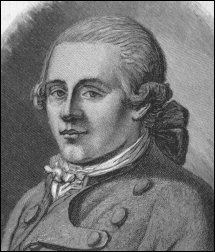The Influence of J.M.R. Lenz’s The Soldiers On Brecht’s Mother Courage and Her Children
Introduction
Within his rather brief lifetime, Jacob Michael Reinhold Lenz (1751-1792) faded into obscurity, and would have remained there, the “transient meteor” that his contemporary Goethe predicted he would be, were it not for his influence on German dramatists of the nineteenth and twentieth centuries.1 Lenz survived as a literary force for centuries without either popular or critical acclaim, due to being a writer’s writer. Over the past fifty years, a consensus of scholars—particularly specialists in Sturm und Drang and 18th Century German drama—have credited this eccentric genius with founding the modern tradition in German theatre. This tradition includes Georg Büchner (1813-1837) and Frank Wedekind (1864-1918) and culminates in the work of Bertolt Brecht (1898-1956).
Brecht scholars and Brecht himself, who was inclined to concede exotic influences, have expressed little on the subject of Lenz. Certainly Lenz interested Brecht since the late twenties, though in his youth he evidently preferred other German writers such as Büchner, Kleist, Wedekind, Goethe, and Schiller.2 Later, Brecht’s interest in Lenz increased. Elisabeth Hauptmann, his collaborator and life-long friend, recalled in an interview that Brecht spoke in the late twenties about staging Lenz’s play The Tutor, a project he carried out after the war.3
A sonnet Brecht wrote, “On Lenz’s Bourgeois Tragedy The Tutor”—probably written in 1938 because it was discovered in a file of Galileo fragments that were dated that year—addresses The Tutor’s notorious castration scene .4 The poem, like his adaptation of Lenz’s play more than ten years later, alters the rationale of the protagonist unsexing himself, transforming it from a psychological gesture into a sociological or professional one.5 This and another sonnet written in the same period (1933-1938) regarding Lenz’s one-time professor Immanuel Kant, “On Kant’s Definition of Marriage in The Metaphysics of Ethics,” offer evidence that Brecht was preoccupied with J.M.R. Lenz in the year before he wrote Mother Courage and Her Children in 1939.6
It is my contention that Lenz influenced the planning and writing of Mother Courage, a subject on which Brecht was curiously mute. In his journal of the period September 21st to November 7th, 1939—the seven weeks in which he wrote Mother Courage—there are no entries at all.7 This deeply insightful play was Brecht’s reaction to Hitler’s invasion of Poland and an attempt, through its anti-war leitmotif, to stall the outbreak of world war. The editors and translators John Willet and John Manheim maintain that it is one of the most “spontaneous” of all of Brecht’s plays. Moreover, they say that it has “virtually no trace of any preliminary work or preparatory reading” and that “for once no mention of any other collaborator, nor any element of borrowing or adaptation” are evident.8


Recent Comments